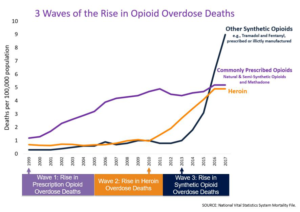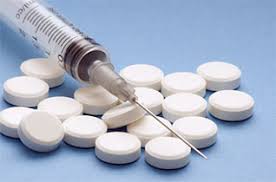Do you know……. As the opioid epidemic worsens and Fentanyl, a highly potent opiate, one of the most powerful drugs ever created, which is now the leading cause of overdose deaths, I thought of doing some investigation and sharing the information with my readers, clients, family, and friends. Heroin and other opioids are ravaging communities across America, as a matter of fact the entire world. According to CDC (Centers for Disease Control and Prevention), on average, 130 Americans die every day from an opioid overdose and in 2017, the number of overdose deaths involving opioids (including prescription opioids and illegal opioids like heroin and illicitly manufactured fentanyl) was 6 times higher than in 1999. The Nation is amidst an unprecedented opioid epidemic. Prevention and access to treatment for opioid addiction and overdose reversal drugs are critical to fighting this epidemic for individuals with both behavioral health (including substance use) and primary care needs.
Opioids are so often misused, because while they are prescribed for the treatment of moderate to severe pain, they induce the feelings of euphoria and stress relief. Because of this inherent qualities of opioids, patients/users start misusing opioids, taking them in larger quantities than prescribed and become addicted. Opioids, natural or synthetic, illicit or prescribed, act on the body’s opioid receptors on nerve cells in the body and brain and all carry similarly high risks of dependency, addiction and overdose. In 2017 HHS (US Dept of Health and Human Services) declared a public health emergency and announced a 5-Point Strategy To Combat the Opioid Crisis:
- Improving access to treatment and recovery services;
- Promoting use of overdose-reversing drugs;
- Strengthening our understanding of the epidemic through better public health surveillance;
- Providing support for cutting edge research on pain and addiction; and
- Advancing better practices for pain management
What are Opioids? https://en.wikipedia.org/wiki/Opioid_epidemic
Opioids are a diverse class of moderately strong painkillers, including Oxycodone (commonly sold under the trade names OxyContin and Percocet), hydrocodone (Vicodin, Norco), and a very strong painkiller, Fentanyl, which is synthesized to resemble other opiates such as opium-derived morphine and heroin.[1] The potency and availability of these substances, despite their high risk of addiction and overdose, have made them popular both as medical treatments and as recreational drugs. Due to their sedative effects on the part of the brain which regulates breathing, the respiratory center of the medulla oblongata, opioids in high doses present the potential for respiratory depression, and may cause respiratory failure and death.
A person who is addicted develops an overpowering urge, or craving, for the drug. The person also experiences a loss of control and painful withdrawal symptoms, making it more difficult to taper off or refuse the drug. The current opioid epidemic is the increase in directly injecting opioids or other substances into a vein (Intravenous -IV drug use). To safeguard the spread of this epidemic and help family, friends, or a loved one:
- Educate yourself to spot the early warning signs.
- Patient or the care giver should monitor how many pills are in each of prescription bottles or pill packets, and keep track of refills. If you find you need to refill your medicine more often than expected, that could indicate a problem. Keep prescription drugs locked away from children and other’s reach.
- Safely disposing of expired or unused medicine is a critical step in helping to decrease the opportunity for adults or your kids or their friends to abuse your medicine. The ideal way to dispose off safely through local legally organized collection centers or drug take-back day, an ongoing program in community, a drug deactivation bag, or a drug mail-back program. To find a take-back location or event near you, visit the American Medicine Chest Challengeor the DEA website.
- Reach out for assistance and take help.
Opioids use (prescribed or illegal) pose a significant health problem throughout much of North America. It’s beyond the scope of this article to cover every aspect of opioid epidemic and crisis. For more information, please do personal research, inquires, and educate yourself. Some useful sites:
https://www.hhs.gov/opioids/about-the-epidemic/index.html
https://www.cdc.gov/drugoverdose/epidemic/index.html
Om Healing………..Uma
(Founder of AromaWellness)
visit aromawellness.net, to order
Call 414-793-8645, to schedule your consultation appointment





Recent Comments